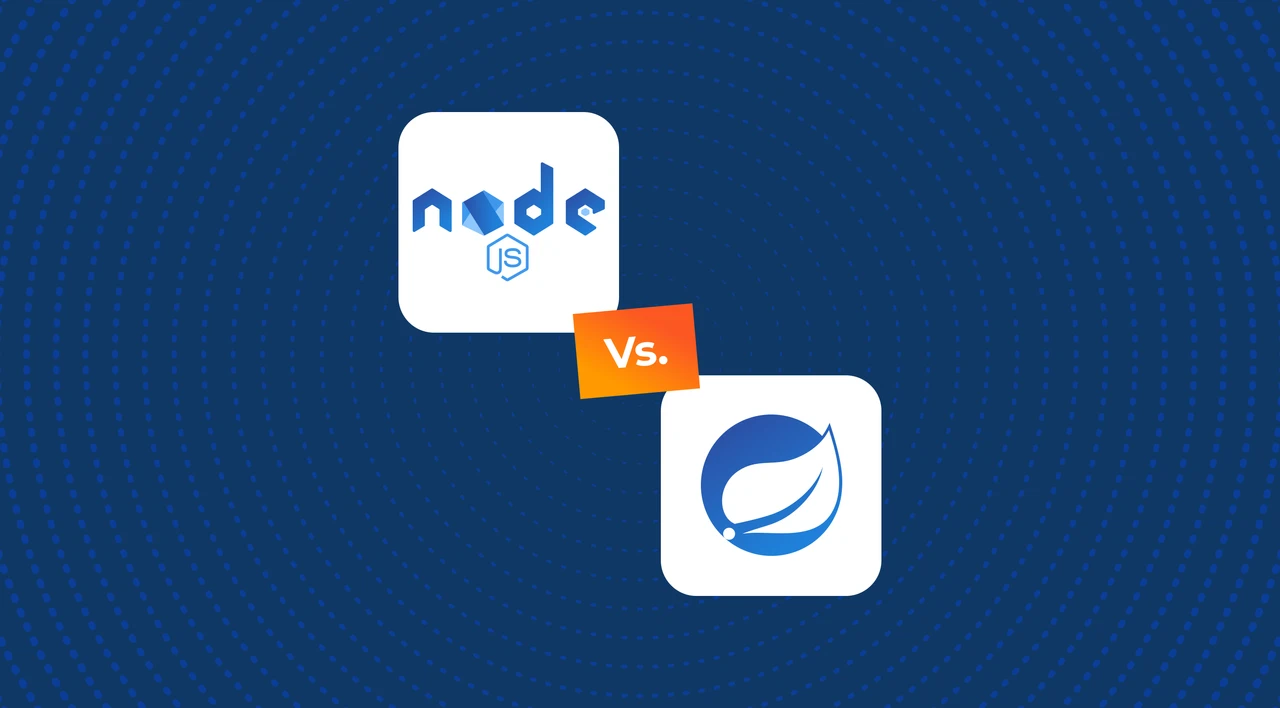SHARE
Node.js vs Spring Boot: Which is Better in 2026?

Contents
Contents
Introduction
The question of which app framework is better between Node.js and Spring Boot continues to recur amongst developers.
Node.js and Spring Boot are popular and widely used technologies with their own unique advantages and use cases.
The choice between the two will depend on factors such as project requirements, programming language preference, and the skill set of the development team.
We would recommend developers evaluate the pros and cons of each of the web servers. You may choose the one that best suits the project’s needs.

What is Node.js?
Node.js is an open-source server environment. It is an asynchronous event-driven framework built on a JavaScript runtime engine.
It is a popular and widely used JavaScript runtime environment for developing scalable, high-performance server-side applications.
It has a non-blocking I/O model makes it ideal for building real-time applications and APIs.
Node.js is also known for its event-driven architecture, which allows for handling many concurrent requests.
What is Node.js used for?
One of the greatest perks of Node.js is the ability to handle multiple simultaneous connections.
Given its popularity, developers use Node.js to build server-side applications. Some of the common use cases for Node.js include:
Building web applications
Node.js can be used to build full-stack web applications using JavaScript on both the front and back end.
Building APIs
Node.js is also commonly used to build RESTful APIs and other web services, as it has a non-blocking I/O model that allows for handling many concurrent requests.
Real-time applications
Node.js is well-suited for building real-time applications like chat apps, multiplayer games, and live streaming.
Command-line tools
Node.js can also be used to build command-line tools and scripts, as it provides access to the file system and other low-level system resources.
Popular Node.js Web Frameworks
Some of the renowned Node.js web frameworks include.
Express.js
Express.js is one of the most popular Node.js web frameworks, known for its minimalist approach to building web applications and APIs.
Koa.js
Koa.js is a lightweight web framework known for its simplicity and ease of use.
Nest.js
Nest.js is a progressive Node.js framework for building scalable and efficient server-side applications.
Meteor.js
Meteor.js is a full-stack JavaScript framework that allows for building real-time web applications using Node.js on the server side and MongoDB on the database side.
Hapi.js
Hapi.js is a powerful and extensible Node.js web framework focusing on security and reliability.
What is Spring Boot?
Spring Boot is a Java-based framework that provides a simpler and faster way to build a production-grade Spring Boot application.
It offers a wide range of pre-built features, such as auto-configuration, making setting up and configuring your Spring Boot application easier.
Spring Boot also provides robust security features, making it a popular choice for enterprise applications.
What is Spring Boot used for?
Spring Boot is a Java-based framework that is used for building enterprise-grade applications. It provides a faster and simpler way to develop production-grade applications.
It offers a wide range of pre-built features, such as auto-configuration, making setting up and configuring your application easier.
Other widely known uses of Spring Boot include:
Building micro-services
Spring Boot is commonly used for building microservices and cloud-native applications, as it supports containerization and cloud platforms.
Building web applications
It can also be used for building custom web applications and RESTful APIs, as it provides a wide range of pre-built libraries and tools for working with databases, security, and other common web development tasks.
Building batch applications
Spring Boot is well-suited for building batch-processing applications such as ETL jobs and data processing pipelines.
Advantages of Node.js over Spring Boot
JavaScript ecosystem
Node.js has a large and vibrant JavaScript ecosystem, with a wide range of libraries and tools available for building web applications, APIs, and real-time applications.
Non-blocking I/O
Node.js has a non-blocking I/O model that handles many concurrent requests, making it well-suited for building real-time applications and APIs.
Scalability
Node.js is highly scalable, as it can handle a large number of requests without consuming a lot of system resources.
Advantages of Spring Boot over Node.js
Java ecosystem
It is built on top of the Java ecosystem, with a rich set of libraries and tools for building an enterprise-grade Spring Boot application.
Strong typing
Developers can run JavaScript code using Spring Boot. Java is a strongly typed language, which can help catch errors at compile time rather than runtime.
Performance
Java is known for its performance, so developers can build scalable network applications using Spring Boot. It can handle many client requests with high throughput and low latency.
Node.js vs. Spring Boot Comparison
Programming Language – Java vs. JavaScript
Node.js is based on JavaScript, while Spring Boot is based on Java.
Learning Curve
Node.js has a lower learning curve than Spring Boot, as JavaScript is easier to learn and more accessible than Java.
Stability
Both Node.js and Spring Boot are stable and widely used in production environments.
Community Support
Both Node.js and Spring Boot have strong and active communities with many resources and support available.
Popularity
Node.js and Spring Boot are popular and widely used in their respective domains. Many companies and developers use them to build web applications, APIs, and other applications.
Node.js vs Spring Boot: Which is Better?
The choice between Node.js and Spring Boot depends on the specific requirements and goals of the project.
Node.js is well-suited for building real-time applications, APIs, and scalable web applications, while Spring Boot is an excellent choice for building enterprise-grade applications with Java.
Ultimately, the choice between the two will depend on factors such as programming language preference, project requirements, and the skill set of the development team.
Summary
Regarding which one is better in 2024, both Node.js and Spring Boot are still relevant and widely used in their respective domains.
Node.js is particularly suited for building real-time applications, while Spring Boot is an excellent choice for building an enterprise-grade Spring Boot application with Java.
Choosing between the two will ultimately depend on your project’s specific needs and goals.
Frequently Asked Questions
What is the node package manager (NPM)?
NPM is a package manager for Node.js that allows developers to easily install and manage third-party libraries, tools, and other dependencies in their Node.js projects.
NPM provides a registry of thousands of packages easily installed and managed through a command-line interface.
What alternatives are there to Node.js and Spring Boot?
Several Node.js and Spring Boot alternatives for building web applications and APIs exist.
Some popular alternatives to Node.js include Ruby on Rails, Django (Python), Flask (Python), and ASP.NET (C#).
Some popular alternatives to Spring Boot include Micronaut, Quarkus, Dropwizard, and Play Frameworks.
How do you learn Node.js development?
To learn Node.js development, one can start by learning the basics of JavaScript. You may then move on to understanding the Node.js runtime and its various modules and libraries.
Several resources are available for learning Node.js, including online tutorials, documentation, and courses.
What is a backend web framework?
A backend web framework is a software framework that provides tools and libraries for building web applications and APIs on the server side.
The framework typically supports routing, database access, security, and user authentication tasks.
What is the difference between Java and JavaScript?
Java is a statically-typed programming language that is used for building enterprise-grade applications.
JavaScript is a dynamically-typed programming language to build client-side and server-side web applications.
Java is compiled to bytecode and runs on the Java Virtual Machine (JVM), while JavaScript is interpreted and runs in a browser or on the server side using a JavaScript runtime such as Node.js.
Java is known for its performance and scalability, while JavaScript is known for its ease of use and flexibility.
Additionally, Java has a more verbose syntax than JavaScript, which is more lightweight and concise.
Professional Node.js Development Services
Flatirons Development offers top-rated Node.js development services.
Get the CEO's Take
Handpicked tech insights and trends from our CEO.
Professional Node.js Development Services
Flatirons Development offers top-rated Node.js development services.
Get the CEO's Take
Handpicked tech insights and trends from our CEO.

What is IT OT Convergence? Streamlining Operations for Efficiency
Flatirons Development
Oct 28, 2025
Secure Mobile App Development: Prioritizing Data Protection
Flatirons Development
Oct 22, 2025
What is Data Ingestion? Definition, Types, and Best Practices for Efficient Data Processing
Flatirons Development
Oct 16, 2025
Enterprise Computing: Transforming Business Operations
Flatirons Development
Oct 09, 2025
Explore the Top Embedded Systems Examples of Today
Flatirons Development
Oct 04, 2025
Best Manual Testing Tools to Boost Your Software Quality
Flatirons Development
Sep 28, 2025
What is IT OT Convergence? Streamlining Operations for Efficiency
Flatirons Development
Oct 28, 2025
Secure Mobile App Development: Prioritizing Data Protection
Flatirons Development
Oct 22, 2025
What is Data Ingestion? Definition, Types, and Best Practices for Efficient Data Processing
Flatirons Development
Oct 16, 2025
What is IT OT Convergence? Streamlining Operations for Efficiency
Flatirons Development
Oct 28, 2025
Secure Mobile App Development: Prioritizing Data Protection
Flatirons Development
Oct 22, 2025
What is Data Ingestion? Definition, Types, and Best Practices for Efficient Data Processing
Flatirons Development
Oct 16, 2025
What is IT OT Convergence? Streamlining Operations for Efficiency
Flatirons Development
Oct 28, 2025
Secure Mobile App Development: Prioritizing Data Protection
Flatirons Development
Oct 22, 2025
What is Data Ingestion? Definition, Types, and Best Practices for Efficient Data Processing
Flatirons Development
Oct 16, 2025